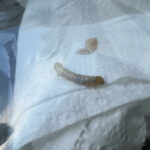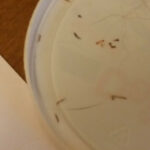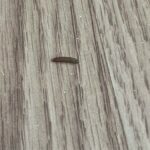You may wonder how to kill tapeworm larvae in the soil before they infect your pets or even you. There’s no easy answer, because the soil is teeming with many different kinds of critters and crawlies, both good and bad. Before you think about killing tapeworm larvae in the soil, it may be helpful to understand this parasite’s life cycle and how it travels from host to host.
Many types of tapeworm exist that infect humans and animals. Some are rare or nonexistent in the U.S., while others thrive around the world. Like many other parasites, tapeworms require a living host – in particular, any host with a spine – to continue their life cycles. However, a portion of their lives is spent outside of a human or animal host, typically in soil or feces. For instance, fleas in their larval stage consume the tapeworm eggs. When an animal eats the flea, tapeworm eggs are released in the system and migrate to the intestine.
Animals in the wild are at particular risk. They will typically hunt rodents or other small animals that are infected. It’s these rodents, of course, that have consumed infected fleas!
Tapeworm is sometimes spread through undercooked foods, including beef, pork, and fish. Cooking to proper temperatures will eliminate the threat of humans developing an internal infestation. Once ingested, the tapeworms lay eggs, which are eliminated in feces. This can easily become epidemic in underdeveloped parts of the world with poor sanitation. Animals, in turn, graze or eat in these areas and continue the life cycle of a tapeworm. For example, a pig can become the “intermediate” host with tapeworms residing in muscle tissue.
Preventing infection by killing tapeworm larvae in the soil is probably an impossible task. Even in livestock areas, animal owners take precautions other than attempting to treat the soil. They will rotate the grazing areas and give inhabited spaces a chance to clear naturally. Keeping animal droppings picked up and disposed of is also a primary precaution. A landowner fertilizing with improperly treated water is also increasing the risk for tapeworm spread.
A first line of defense for pet owners is to attack flea populations, both indoors and outside. When treating any area, be sure to follow label instructions carefully and keep children and pets away until any chemical applications have dried.
Rather than trying to kill tapeworm larvae in the soil, try managing activity areas. Alternate sections of the yard where pets and children play. Pick up after all animals immediately and dispose of the droppings in a sealed baggie. Tapeworm eggs reach the larval stage in about four days. Without a host transfer, they will die. Sunlight will also aid in helping to eliminate problems. Clean out any wet or damp spots and remove excess wood or other materials that remain moist on the undersides. Don’t allow pets to eat off the ground and keep their bowls clean.
Finally, tapeworm larvae and eggs can transfer with poor hygiene. Always wash hands after being outdoors, playing with animals or swimming in public pools. While the soil may be teeming with living creatures, including tapeworm larvae, common sense is one of the best preventatives.
All About Worms is always free, always reader-supported. Your tips via CashApp, Venmo, or Paypal are appreciated! Receipts will come from ISIPP Publishing.

















Is there anything I can put on my yard to make sure my dogs do not get re-infected with tapeworms? I want to cover the other types of worms as well, even though they don’t have them. I do not have fleas in my yard or on my dogs. I use confortis regularly. Do not know how they got tapewormsome. Thanks for any help you can give me! ?
Is there anything I can put on my yard to make sure my dogs do not get re-infected with tapeworms? I want to cover the other types of worms as well, even though they don’t have them. I do not have fleas in my yard or on my dogs. I use confortis regularly. Do not know how they got tapewormsome. Thanks for any help you can give me! ?
P.S. Only just realized that our author who wrote this article made the title be “How to Kill Tapeworm Larvae in Soil” ..well gosh that was misleading, and we apologize for that. We have changed it. That author is no longer with us (this is a very old article).
THANK YOU, Debra Primeaux!! This article and so many others are highly disappointing. I am fostering a dog who was covered with fleas when he came into the rescue, and now we’ve found he has tapeworms. I don’t want to be preached at about prevention – I clicked on an article about killing tapeworm larvae in soil, and that is what I want to know! I try to pick up all the little segments when I clean up after this poor dog, but I want to make sure I’m killing them all so my other pets don’t get infected.
The reason that you are unable to find information on how to kill worms on this site is because this site never advocates the killing of anything. This is a site that is an information site about worms, not about how to kill them. We *do* tell how to prevent, how to mitigate, etc., but not how to kill. We’re sorry that you found our articles “highly disappointing”.
I have been on a few different sites and still haven’t got my answer. We have a 3 year old and we got her a new puppy that we had to get rid of because we couldn’t get rid of the tapeworms she was only 8 weeks old and we had got her at exactly 6 weeks old and I wormed her a few times and she had to stay on our big porch the worms were coming out but now all in my porch I have tapeworm eggs. What chemical can I use to kill them so my kid can go back on the porch??? Will Clorox bleach work to kill the eggs and can they get in your body threw your feet? I just need to know what to I have to do to kill the tapeworm eggs on my porch and my grass??? Can you help me please??!!!